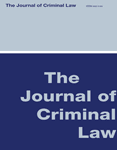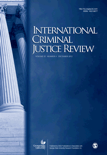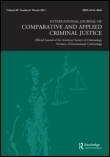
Journal of Criminal Law
Scope & Guideline
Pioneering Research in the Realm of Law
Introduction
Aims and Scopes
- Interdisciplinary Approaches to Criminal Law:
The journal emphasizes interdisciplinary perspectives, integrating insights from psychology, sociology, and criminology to enhance understanding of criminal behavior and legal processes. - Policy and Legislative Analysis:
A significant portion of the journal's content critiques and analyzes existing laws and proposed reforms, providing valuable insights into the implications of legislative changes on justice outcomes. - Mental Health and Criminal Justice:
The focus on mental health issues within the criminal justice system is a recurring theme, exploring the intersection of mental health law, offender treatment, and societal implications. - Victimology and Rights:
The journal frequently addresses the rights and experiences of victims, examining how legal frameworks can better serve and protect vulnerable populations. - Comparative Legal Studies:
It includes comparative analyses of criminal laws across jurisdictions, fostering an understanding of diverse legal frameworks and their effectiveness in addressing crime. - Emerging Technologies in Criminal Justice:
Research on the implications of technology within criminal justice, including digital evidence and cybercrime, is increasingly prominent, reflecting the evolving nature of crime.
Trending and Emerging
- Sexual Offenses and Consent:
There is a significant uptick in research focusing on sexual offenses, particularly around issues of consent, coercion, and legal definitions, indicating a societal push for reform and clarity in this area. - Impact of Mental Health on Criminal Justice:
Emerging themes concerning mental health, including the treatment of mentally ill defendants and the implications for sentencing and legal accountability, are increasingly prominent. - Digital Crime and Cybersecurity:
The journal has expanded its coverage of cybercrime and the legal challenges posed by digital technologies, reflecting the increasing relevance of these issues in contemporary society. - Victim-Centered Approaches:
An emerging focus on victim rights and restorative justice practices highlights a shift towards more inclusive legal frameworks that prioritize the experiences and needs of victims. - Comparative and International Perspectives:
There is a growing trend towards comparative studies that analyze criminal law across different jurisdictions, which enhances the understanding of global legal practices and their implications.
Declining or Waning
- Traditional Theories of Punishment:
Discussions surrounding classical theories of punishment, such as retribution and deterrence, appear less frequently, possibly indicating a shift towards more rehabilitative and restorative justice models. - Focus on Historical Legal Precedents:
There has been a noticeable decrease in papers solely dedicated to historical legal analysis, suggesting a move towards contemporary issues and practical applications of criminal law. - General Criminal Procedure:
Topics covering general procedural aspects of criminal law have waned, possibly as the journal prioritizes more complex and nuanced discussions on specific offenses and legal innovations. - Broad Discussions on General Crime Trends:
The journal has moved away from broad overviews of crime trends, favoring in-depth studies of specific offenses and their legal implications. - Sentencing Guidelines and Normative Frameworks:
While still relevant, discussions on sentencing guidelines are less prominent, potentially as the focus shifts to more innovative or controversial sentencing practices.
Similar Journals

American Journal of Criminal Justice
Transforming Understanding Through Rigorous ResearchAmerican Journal of Criminal Justice is an esteemed publication within the realm of law and criminal justice, recognized for its significant contributions to the understanding and advancement of this vital field. Published by Springer, the journal has established itself as a leading platform for rigorous academic research and scholarly discourse since its inception in 1975. With its impressive 2023 Q1 ranking in the Law category and its 98th percentile ranking in Scopus among social sciences, the journal showcases cutting-edge research that addresses pivotal issues in criminal justice. Though it does not offer open access, its wealth of content is accessible to academic institutions and professionals seeking to deepen their knowledge. The journal aims to foster interdisciplinary collaboration and to provide a forum for innovative methodologies, policy evaluations, and theoretical perspectives, making it a critical resource for researchers, practitioners, and students dedicated to the evolution of criminal justice.

Revista Brasileira de Direito Processual Penal
Advancing Legal Scholarship in Criminal ProcedureRevista Brasileira de Direito Processual Penal, published by the Instituto Brasileiro de Direito Processual Penal (IBRASPP), serves as a vital open-access platform for scholars and practitioners in the fields of criminal procedure law and social sciences. With an ISSN of 2359-3881 and an E-ISSN of 2525-510X, the journal has been committed to disseminating innovative legal research since its opening access in 2015, thus fostering engagement within legal academia. Based in Brazil and reaching an array of international contributors, it has achieved a respectable Q2 ranking in both Anthropology and Law categories as of 2023, appealing to a diverse audience interested in legal studies, sociology, and the interplay with mental health issues. The journal's ongoing commitment to excellence and impactful scholarship is reflected in its competitive standing across multiple Scopus ranks, making it a significant resource for researchers, legal professionals, and students looking to deepen their understanding of procedural law and its implications in contemporary society.

JOURNAL OF CRIMINAL LAW & CRIMINOLOGY
Advancing the Frontiers of Criminal Justice ScholarshipJournal of Criminal Law & Criminology, published by Northwestern University, is a premier scholarly journal dedicated to advancing the understanding of criminal law and criminological theories. Established in 1974, it has a strong history of publishing rigorous empirical research and critical analyses, contributing significantly to the discourse in legal and criminal justice studies. With an impressive impact factor and recognized as a Q1 journal in Law, it ranks favorably within the Scopus database, positioned in the top 25% of its category. This journal is essential for academics, legal practitioners, and students seeking insightful perspectives and developments in contemporary criminal justice issues. Although not open access, it provides a wealth of resources and discussions, making it an invaluable asset for anyone engaged in the study of law and criminology.

International Criminal Justice Review
Pioneering research in international criminal law.International Criminal Justice Review is a premier journal in the field of law, published by SAGE Publications Inc, renowned for its commitment to advancing the understanding of criminal justice issues on a global scale. With an ISSN of 1057-5677, this journal spans a rich history from its inception in 1991 to its ongoing contributions into 2024, supporting a diverse array of research that addresses both theoretical and practical concerns in international criminal law. The journal holds a prestigious Q1 ranking in the Law category for 2023, reflecting its influence and relevance, as evidenced by its impressive Scopus rank of #68 out of 1025 in the Social Sciences Law field, placing it in the 93rd percentile. Though not an open-access journal, it provides vital access options for institutions and individuals alike. International Criminal Justice Review serves as a critical resource for researchers, practitioners, and students dedicated to exploring the complexities of international criminal justice systems, offering a platform for innovative scholarship that informs policy and practice worldwide.

Revista General de Derecho Penal
Advancing the discourse in criminal law.Revista General de Derecho Penal, published by IUSTEL, is a premier academic journal dedicated to the dynamic field of criminal law. With an ISSN of 1698-1189, this journal serves as a crucial platform for researchers, legal professionals, and students to share their insights and findings related to penal law and its evolving applications in contemporary society. Although it is not an open access journal, it maintains high scholarly standards, helping to advance discourse in legal studies. The journal's address is C PRINCESA NO 29, 2A DCHA, MADRID 28008, SPAIN, positioning it within a vibrant academic community. With a focus on current legal challenges and theoretical advancements, Revista General de Derecho Penal plays an essential role in fostering understanding and developing effective legal frameworks in criminal justice, making it an invaluable resource for those engaged in the study and practice of law.

Vestnik of Saint Petersburg University-Law-Vestnik Sankt-Peterburgskogo Universiteta-Pravo
Pioneering Research in the Heart of Russian LawVestnik of Saint Petersburg University-Law, published by St Petersburg University Press, is a vital academic resource in the field of law, particularly significant within the Russian legal landscape. With an ISSN of 2074-1243 and an E-ISSN of 2587-5833, this journal serves as a platform for rigorous research, critical analysis, and scholarly discourse, contributing to the advancement of legal knowledge and practice. Although currently classified in the Q4 quartile for the year 2023 by Scopus rankings, it holds a unique position within the academic community, catering to a diverse audience of researchers, legal professionals, and students, especially those interested in the evolving nuances of law in Russia. You can explore comprehensive studies and articles that reflect the contemporary challenges and developments in law, while benefiting from the journal's focus on fostering a deep understanding of legal principles. The journal runs from 2019 to 2024, encapsulating emerging trends and insights in law that are critical for continuous learning and growth in this discipline.

International Journal of Criminal Justice Sciences
Empowering scholars with open access to critical knowledge.The International Journal of Criminal Justice Sciences is a premier academic publication dedicated to advancing the field of criminal justice through rigorous research and innovative scholarship. Published by MANONMANIAM SUNDARANAR UNIVERSITY in India, this Open Access journal has been a vital platform for researchers since 2006, promoting unrestricted access to critical knowledge and insights in the realm of law and criminal justice. With a commendable Scopus ranking of #379 out of 1025 in the Social Sciences - Law category, placing it in the 63rd percentile, it holds an essential position for those engaged in legal studies. The journal is particularly beneficial for academics, practitioners, and students aiming to explore contemporary issues, innovative practices, and theoretical advancements in the discipline. Its commitment to quality research is reflected in its Q3 Quartile designation and the continuous convergence of research contributions anticipated from 2017 to 2024. Whether you are looking to publish your findings or seek valuable insights from peer-reviewed articles, the International Journal of Criminal Justice Sciences remains an indispensable resource for fostering knowledge and dialogue in this critical field.

Revija za Kriminalistiko in Kriminologijo
Illuminating the Pathways of Crime and SocietyRevija za Kriminalistiko in Kriminologijo is a prominent academic journal dedicated to the fields of criminalistics, criminology, law, and forensic medicine, published by the Ministry of Interior Republic Slovenia. With its inception in 1981, the journal has served as a pivotal platform for disseminating research findings and innovative ideas relevant to crime and justice issues, particularly in the context of Slovenia and the wider region. Despite its current Q4 ranking in various categories, including Law and Pathology & Forensic Medicine, Revija za Kriminalistiko in Kriminologijo remains essential for emerging scholars and professionals seeking to contribute to the discourse in forensic science and social psychology. Although the journal does not offer open access options, it continues to publish rigorous peer-reviewed articles that significantly impact the field, making it a valuable resource for researchers, practitioners, and students alike. Scholars can access the research at the journal's address in Ljubljana, Slovenia, thereby fostering interdisciplinary collaboration and knowledge sharing.

International Journal of Comparative and Applied Criminal Justice
Fostering interdisciplinary connections in justice research.International Journal of Comparative and Applied Criminal Justice, published by ROUTLEDGE JOURNALS, TAYLOR & FRANCIS LTD, stands at the forefront of interdisciplinary research in the fields of law, sociology, and social psychology. With an ISSN of 0192-4036 and an E-ISSN of 2157-6475, this esteemed journal has been disseminating pivotal research since its inception in 1977. Recognized for its rigorous scholarship, it boasts a Q1 ranking in Law and positions itself within the top 85th percentile in Social Sciences - Law, emphasizing its impact on the academic community. Although primarily subscription-based, its accessibility ensures that critical findings reach a wide audience, supporting the advancement of knowledge across various disciplines. The journal's scope encompasses significant developments in applied criminal justice, making it an invaluable resource for researchers, policymakers, and students dedicated to understanding and improving justice systems globally. In its commitment to academic excellence, the journal continues to foster innovative dialogue and promote knowledge exchange, contributing significantly to current debates within the social sciences.

Journal of Penal Law and Criminology-Ceza Hukuku ve Kriminoloji Dergisi
Shaping the Future of Criminological ResearchThe Journal of Penal Law and Criminology-Ceza Hukuku ve Kriminoloji Dergisi, published by ISTANBUL UNIV, is a prestigious platform dedicated to the advancement of knowledge in the fields of criminal law and criminology. With its Open Access policy adopted since 2017, it aims to promote the dissemination of research findings and theoretical discussions, ensuring that vital insights in criminal justice, legal reforms, and criminological studies are accessible to a global audience. This journal serves as a vital resource for academics, legal practitioners, and students alike, fostering interdisciplinary dialogue and encouraging innovative research. By focusing on contemporary issues in penal law and criminology, the journal enhances understanding and addresses the complexities of justice in a rapidly changing society. With an ISSN of 2148-6646 and an E-ISSN of 2602-3911, it continuously strives to maintain high scholarly standards and relevance in its contributions to the field.